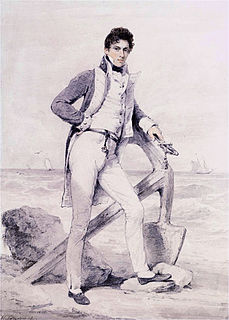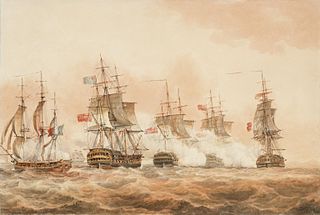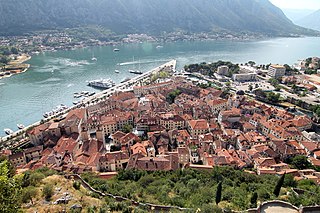James Hoste may refer to:
- James Hoste (Castle Rising MP) (1633–1699)
- James Hoste (Bramber MP) (1705–1744)
James Hoste may refer to:

In the mathematical field of topology, knot theory is the study of mathematical knots. While inspired by knots which appear in daily life, such as those in shoelaces and rope, a mathematical knot differs in that the ends are joined so it cannot be undone, the simplest knot being a ring. In mathematical language, a knot is an embedding of a circle in 3-dimensional Euclidean space, . Two mathematical knots are equivalent if one can be transformed into the other via a deformation of upon itself ; these transformations correspond to manipulations of a knotted string that do not involve cutting it or passing through itself.

Captain Sir William Hoste, 1st Baronet KCB RN, Royal Navy captain. Best known as one of Lord Nelson's protégés, Hoste was one of the great frigate captains of the Napoleonic wars, taking part in six major actions including the capture of the heavily fortified port of Kotor. He was, however, absent from Trafalgar having been sent with gifts to the Dey of Algiers.

Het Laatste Nieuws is a Dutch language newspaper based in Antwerp, Belgium. It was founded by Julius Hoste Sr. on 7 June 1888. It is now part of DPG Media, and is the most popular newspaper in Flanders and Belgium.

Dixon Edward Hoste was a British Protestant Christian missionary to China and the longest lived of the Cambridge Seven. He became the successor to James Hudson Taylor as General Director of the China Inland Mission,.
Hoste may refer to:
Julius Hoste may refer to:

Frank Hoste is a retired Belgian racing cyclist, who won the points classification in the Tour de France in 1984 as well as three stage victories. Hoste was a professional cyclist from 1977 to 1991, then he started a bicycle factory. He competed in the individual road race and team time trial events at the 1976 Summer Olympics.
James Stronge may refer to:
Hoste da Reggio was an Italian composer of the Renaissance, active in Milan and elsewhere in northern Italy. He was well known for his madrigals, which were published in several collections in Venice.

The Adriatic campaign was a minor theatre of war during the Napoleonic Wars in which a succession of small British Royal Navy and Austrian Navy squadrons and independent cruisers harried the combined naval forces of the First French Empire, the Kingdom of Italy, the Illyrian Provinces and the Kingdom of Naples between 1807 and 1814 in the Adriatic Sea. Italy, Naples and Illyria were all controlled either directly or via proxy by the French Emperor Napoleon I, who had seized them at the Treaty of Pressburg in the aftermath of the War of the Third Coalition.

The Battle of Lissa, also known as the Battle of Vis; French: Bataille de Lissa; Italian: Battaglia di Lissa; Croatian: Viška bitka) was a naval action fought between a British frigate squadron and a much larger squadron of French and Italian frigates and smaller vessels on Wednesday, 13 March on 1811 during the Adriatic campaign of the Napoleonic Wars. The engagement was fought in the Adriatic Sea for possession of the strategically important Croatian island of Vis, from which the British squadron had been disrupting French shipping in the Adriatic. The French needed to control the Adriatic to supply a growing army in the Illyrian Provinces, and consequently dispatched an invasion force in March 1811 consisting of six frigates, numerous smaller craft and a battalion of Italian soldiers.

The action of 29 November 1811 was a minor naval engagement fought between two frigate squadrons in the Adriatic Sea during the Adriatic campaign of the Napoleonic Wars. The action was one of a series of operations conducted by the British Royal Navy and the French Navy to contest dominance over the Adriatic between 1807 and 1814. During this period the Adriatic was surrounded by French territory or French client states and as a result British interference was highly disruptive to the movement of French troops and supplies.
Edward Greene was an English brewer and Conservative politician who sat in the House of Commons between 1865 and 1891.
Two ships of the Royal Navy have borne the name HMS Hoste, after Captain Sir William Hoste. A third was planned, but entered service under a different name:
USS Hoste has been the name of more than one United States Navy ship, and may refer to:
The third HMS Hoste (K566), ex-Mitchell, was a Captain-class frigate of the Evarts-class of destroyer escort, originally commissioned to be built for the United States Navy. Before she was finished in 1943, she was transferred to the Royal Navy under the terms of Lend-Lease, and saw service during the World War II from 1943 to 1945.

The Siege of Ragusa or Siege of Dubrovnik was fought between local Ragusan insurgents, as well as Austrian Croat troops and the British Royal Navy under Captain William Hoste against a French garrison under Joseph de Montrichard between 19 and 27 January 1814 during the Adriatic campaign of the Napoleonic Wars. The siege was fought on the coast of the Adriatic Sea for possession of the strategically important fortified town of Ragusa.

The Siege of Cattaro was fought between a British Royal Naval detachment and Montenegrin forces under Captain William Hoste, John Harper and Petar I Petrović-Njegoš respectively and the French garrison under command of Jean-Joseph Gauthier of the mountain fortress of Cattaro. The siege lasted from 14 October 1813 to 3 January 1814 during the Adriatic campaign of the Napoleonic Wars when the French surrendered. The engagement was fought in the Adriatic Sea for possession of the important fortress of Cattaro.
James Hoste (1633–1699), of Wood Hall, Sandringham, Norfolk, was an English politician.
James Hoste ), of Sandringham, Norfolk was a British landowner and Whig politician who sat in the House of Commons from 1728 to 1734.